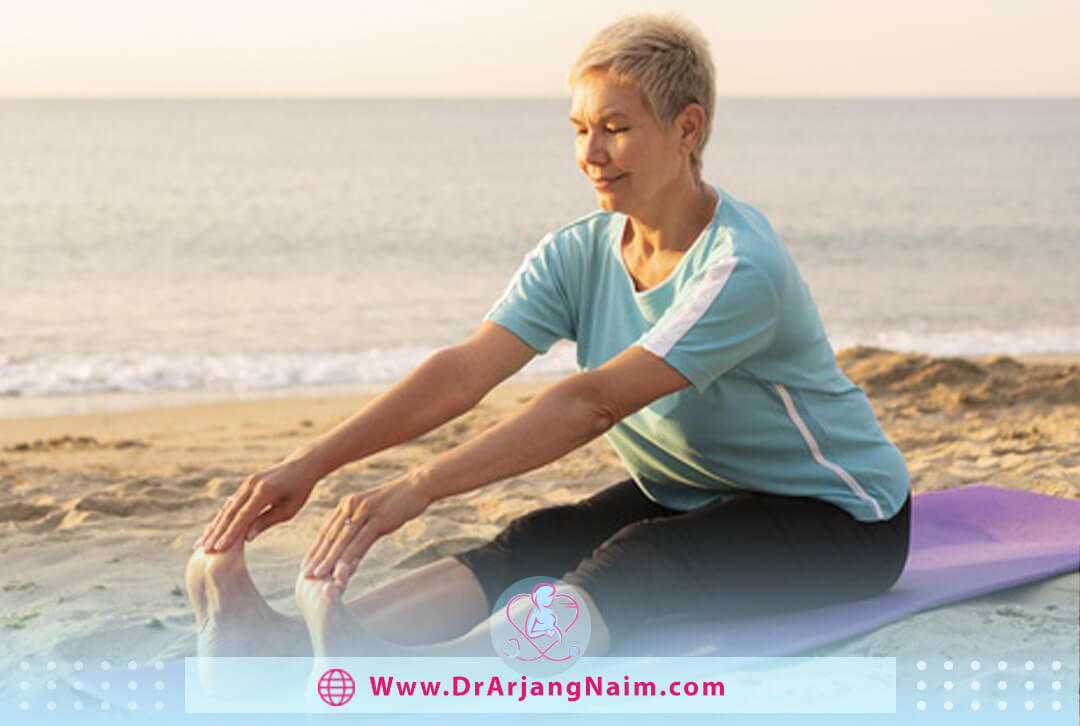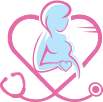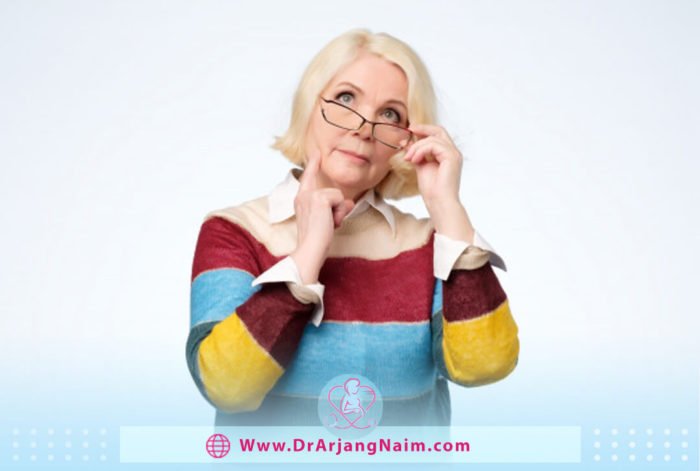Menopause, also known as the climacteric, means interrupting the menstrual cycle. Menopause, perimenopause, or postmenopause are stages of menopause in a woman’s life when her menstrual cycle stops. A postmenopausal woman loses the ability to conceive and experiences moderate to severe symptoms due to hormonal fluctuations.
All of the stages of menopause can lead to depression and changes in the normal course of life. But all women should know that menopause is not a disease and does not mean that it is nearing the end of their lives. Interestingly, it does not necessarily occur in middle age; some young women may also experience it.
The cause of climacteric is primary ovarian failure; estrogen secreted from the ovary decreases, and FSH increases. These hormonal changes cause a series of symptoms and complications. Premenopause is the first step in this process and can start eight to 10 years before menopause. Climacteric is the point at which a woman does not menstruate for at least another 12 months. Postmenopause is the stage after menopause.
Why does menopause happen?
Natural menopause occurs in the early 50, is not caused by surgery or any other medical condition, and is a natural part of aging. Climacteric is a full year without menstrual bleeding, in the absence of any surgery or medical condition that may cause an artificial cessation of bleeding.
The menstrual cycle is active from puberty onwards. As menopause approaches, the ovaries produce less of a hormone called estrogen. When this hormone decline occurs, the menstrual cycle begins to change. It may become irregular and then stop. As the body adapts to different levels of hormones, physical changes may also occur. The symptoms at each stage of menopause are part of the body’s adaptation to these changes.
Premenopause vs. perimenopause
Perimenopause and perimenopause are sometimes used interchangeably, but they have different meanings. Premenopause is when having no symptoms of perimenopause or menopause. In Premenopause, there are regular and irregular menstrual cycles, and the fertile years are not over yet. Some hormonal changes may occur, but no noticeable changes are observed in the body. Perimenopause means around menopause and refers to the time during which the body makes the natural transition to menopause, marking the end of the reproductive years.
Stages of menopause
Doctors have divided this period into three stages; in each stage, a gradual change usually occurs over several years.
Perimenopause
The Perimenopause period or transition to menopause begins several years before menopause. This is when the ovaries gradually begin to produce less estrogen. It usually starts in women 40 years old but can begin at 30 years or even earlier. This period lasts until menopause, when the ovaries stop secreting eggs. In the last 1 to 2 years of menopause, this decrease in estrogen accelerates.
At this stage, many women have menopausal symptoms. This period lasts until climacteric, when the ovaries stop secreting eggs. In the last 1 to 2 years of Perimenopause, this decrease in estrogen accelerates. At this stage, many women have menopausal symptoms. The average course length is four years, but this stage may only last a few months or even ten years for some women. This period ends when women spend 12 months without a period. Perimenopause women experience some of these symptoms:
- Hot flashes
- Breast tenderness
- Worse premenstrual syndrome
- Lower sex drive
- Mood swings
- Trouble sleeping
- Vaginal dryness
- Urine leakage when coughing or sneezing
- Urinary urgency
- Fatigue
- Irregular periods
Irregular periods are common during this period. But other conditions can cause changes in menstrual bleeding. If any of these conditions are present, see a doctor:
- Periods are very heavy, or they have blood clots
- Periods last several days longer than usual
- Have spotting after sex
- Have spotting between periods
- Periods happen closer together
Can I get pregnant during menopause?
Despite the decrease in fertility in the Perimenopause stage, it is still possible to get pregnant during this period, so birth control methods should be used to prevent pregnancy.
Risk factors
Menopause is a natural stage in life. But it may happen to some women sooner than others. Although not conclusive, there is some evidence that certain factors increase the risk of Perimenopause at an early age, including:
- Smoking: The onset of climacteric in women smokers occurs one to two years earlier than in women nonsmokers.
- Family history: Women with a family history of early menopause may experience it.
- Cancer treatment: Treating cancer with chemotherapy or radiation can cause premature climacteric.
- Hysterectomy: Hysterectomy, in which the entire uterus is removed, but the ovaries are not removed, usually does not cause climacteric. Although menstruation does not occur, the ovaries still produce estrogen. But such surgery may cause menopause to occur earlier than normal. Also, if an ovary is removed, the remaining ovary may rupture sooner than expected.
Treatments that relieve the symptoms of Perimenopause

Many women get rid of hot flashes after taking low-dose birth control pills for a short time. Other options that may control hot flashes include contraceptive patches, vaginal rings, and progesterone injections. A doctor must prescribe all medications used. Doing things that improve public well-being may also make feel better, such as:
- Exercise
- Stop smoking
- Drink less alcohol
- Get to a healthy weight and stay there
- Get enough calcium in the diet
- Take a multivitamin if needed
- Adequate and regular sleep
Vaginal lubricants may be recommended if the vagina is dry. Other treatments available to help relieve the various symptoms of menopause may include antidepressants for mood swings. Talk to a doctor about specific symptoms and treatment goals. This allows them to prescribe the right treatment.
Menopause
During menopause, a woman’s ovaries no longer release eggs, and estrogen production in the ovaries slows down significantly. Symptoms experienced during premenopause may persist into menopause. Climacteric is generally defined as when a woman does not menstruate for 12 consecutive months.
This period occurs at an average age of about 51 years. A woman may experience Perimenopause symptoms during this period, but these symptoms can become more pronounced because hormone levels will drop significantly. The most common symptoms include:
- Night sweats
- Hot flashes
- Depression
- Anxiety or irritability
- Dry skin
- Vaginal dryness
- Frequent urination
- Mood swings
- Insomnia
- Fatigue
Treatments that relieve the symptoms of Menopause
If the symptoms of menopause are severe and affect the quality of life, treatment may be needed. Hormone therapy may be given to women under 60 or within ten years of the onset of menopause to reduce or manage symptoms. Common treatments include:
- Hormone therapy: Estrogen therapy is the most effective treatment to relieve symptoms. Depending on personal and family medical history, the doctor may recommend estrogen at the lowest dose and the shortest time needed to relieve symptoms. Progestin may be prescribed in addition to estrogen. In addition to reducing symptoms, estrogen therapy also helps prevent bone loss. Long-term use of hormone therapy may cause side effects, so consult doctors about the benefits and risks of hormone therapy.
- Vaginal estrogen: Another annoying symptom of this period is vaginal dryness. To relieve vaginal dryness, estrogen can be administered directly into the vagina using a cream, pill, or vaginal ring. This treatment releases only a small amount of estrogen absorbed by the vaginal tissues, which can help relieve vaginal dryness, intercourse discomfort, and some urinary symptoms.
- Low-dose antidepressants: Certain antidepressants may reduce menopausal hot flashes. A low-dose antidepressant to control hot flashes may be helpful for women who cannot take estrogen for health reasons or for women who need antidepressants for mood disorders.
- Medications to prevent or treat osteoporosis: Depending on individual needs, doctors may prescribe medications to prevent or treat osteoporosis. Several medications are available to help reduce bone loss and fracture risk.
Postmenopause
The lifetime of a woman after menopause is called Postmenopause. Many of the annoying symptoms that a Perimenopause woman may have experienced will gradually subside during this time. But as a result of several factors, including lower estrogen levels, postmenopausal women are at greater risk for a number of diseases. Medication or a healthy lifestyle change may reduce the risk of some Postmenopause conditions. After climacteric, hormone levels remain constant, and it is impossible to get pregnant. In the postmenopausal period, the risk of some diseases increases.
Osteoporosis

Osteoporosis is a disease that causes the bones to become thinner. This change in bone density increases after menopause, especially in the first few years after it. After menopause, until the age of 60, bone density may be reduced by up to 25 percent. Osteoporosis exposes bones to fractures, especially in the buttocks, spine, and wrists. Osteoporosis can be treated simply with lifestyle changes that include:
- Consume foods containing calcium and calcium supplements
- Taking vitamin D supplements
- Having physical activity
- Limit alcohol consumption
- Quit Smoking
- Hormone therapy, if necessary
Cardiovascular disease
Climacteric does not directly cause cardiovascular disease, but it may increase the risk. Changes in hormones and blood pressure, cholesterol, and triglycerides can also occur after it. Controlling cardiovascular disease risk includes healthy postmenopausal behaviors that include maintaining a balanced diet, exercising regularly, and not smoking.
Urinary System
Lower levels of estrogen may thin the lining of the urethra. Also, the pelvic floor muscles around the urethra may weaken due to aging or vaginal delivery. This can increase the risk of bladder leakage and urinary tract infections.
Metabolism
Decreasing estrogen lowers the metabolism rate, which causes the body to store fat instead of burning it. But it is important to note that age-related weight gain often occurs with a natural decrease in physical activity and not following a proper diet.
The bottom line
All stages of menopause can be a positive time in life. Often, myths cultivate misconceptions about this natural aging process. Although they can cause noticeable and upsetting changes, they can be effectively controlled. Life after this period is not much different from during the fertile years. During this period, having a proper diet and regular exercise is more important.
Arjang Naim, MD, and his team perform all diagnostic and care services in the three stages of menopause and prescribe treatments if needed to reduce symptoms and disease risk. Do not forget that regular visits to a gynecologist are essential during this period.
Additional questions
- What are menopause mood swings like?
- Irritability
- Sadness
- Depression
- Lack of motivation
- Aggression
- How long does breast pain last during menopause?
It is usually associated with hormonal fluctuations during the menstrual cycle or periods of hormonal changes such as puberty and menopause. However, breast pain can continue after menopause.
- What causes frequent urination in menopause?
Estrogen plays a role in supporting the bladder, so when estrogen levels drop, people may need to go to the bathroom more often and urgently than they are used to.
- How does menopause affect calcium levels?
The two main causes of bone loss in postmenopausal women are postmenopausal estrogen deficiency and age-related processes. Bone turnover increases to high levels, and estrogen deficiency may cause calcium loss through indirect effects on extraskeletal calcium homeostasis.
- What helps with menopause insomnia?
- Follow a regular sleep schedule
- Avoid napping in the late afternoon or evening
- Develop a bedtime routine
- Try not to watch television or use your computer or mobile device in the bedroom
- Keep your bedroom at a comfortable temperature
- Exercise at regular times each day
- Stay away from caffeine late in the day
- Remember, alcohol won’t help you sleep
References
https://healthcare.utah.edu/womenshealth/gynecology/menopause/postmenopause.php
https://www.healthline.com/health/menopause/postmenopausal-health
https://www.webmd.com/menopause/guide/health-after-menopause
https://www.mayoclinic.org/diseases-conditions/perimenopause/symptoms-causes/syc-
https://www.medicalnewstoday.com/articles/318660
https://www.medicinenet.com/menopause/article.htm




